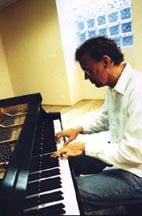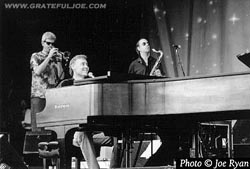Grateful Family and Friend
Bruce Hornsby
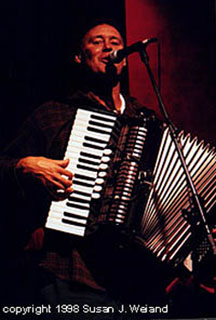
©
2000 www.philzone.com
and www.2012productions.com
Conducted October 9, 2000
Special
thanks to Tim Morris for help with interview preparation
What do you think of the current state of affairs between the GD family?
I have a very clear feeling about this whole problem and it is this: people ask me why do you think that Phil didn’t want to play with The Other Ones and to me it’s fairly simple. I think Phil just really enjoys what he’s doing. At least it seems so to me from the outside because, hell, I haven’t talked to Phil in a year now. It’s obvious really – he really enjoys having his own band. What is Phil, 60 now?
Yes.
Phil is at the point in his life where he probably doesn’t feel like doing anything that he doesn’t really want to do. I think that he totally loves having his own band and being able to perform the music and perform the concerts exactly the way that he envisions it – the way he wants to do it. I know what that’s like because I’ve had my own band for a really long time and it’s by far the most enjoyable thing that I do. So I totally understand that, and I would never begrudge him that opportunity or feel funny about the way he feels about it because I understand that completely and I’m with that. To me it’s very simple, he just wants to have his own band (laughter) and I’d say, "hats off to him!"
I’m sure you’ve gotten some feedback from John Molo and I’ve seen your brother Bobby [Hornsby] a few times at some of the Phil shows….
Yeah up at Burlington [Vermont]… I trust my brother’s opinion. He really knows music and he thinks what they’re doing is fantastic. I think that there’s one big difference between the Phil and Friends group and The Other Ones group and that is The Other Ones group is a side-line for Bobby, Mick, and me – it’s not our main thrust. Bobby’s main focus is Ratdog. Mickey’s main focus has been Planet Drum and now his own group, the Mickey Hart Band and other personal projects. My focus, pretty obviously has been my own group too and has been for over 15 years since I got signed to RCA. Phil’s focus is his group. So this is not a side-line for Phil, this is exactly what he’s into. This is his first choice, his project, his main focus is on this group. That’s a big difference, man.
I think that’s well put.
I would imagine that’s something that can be tough – when they play, he’s really committed, and mind you, don’t get the feeling that I’m trying to say that when we’re doing the Other Ones we’re not committed. Hey, we’re doing our damnedest when we’re up there playing.
Oh no one would question that. (laughs)
We’re trying our best to do something great every night but there’s no doubt that the degree of commitment is different with Phil’s group because that’s really his main thrust and it’s just not ours with The Other Ones. There’s a very real difference.
Has John [Molo] or Phil invited you to come by and sit in sometime?
Well they’ve already got a good piano player. I get most of my information from my brother [Bobby Hornsby] about what Phil’s doing (laughs), and he says that this guy Rob Barraco is doing a fantastic job – so what the hell do they need me for? (laughter)
Well, I’m busy, but if they’d ever come through here… I just haven’t been close to them when they were playing. They haven’t come through DC have they?
No not actually in DC – although they played one show in Columbia, MD this Summer...
Well, DC’s the closest big city to me and it’s not that close. (laughs)
I’m going to ask you a question that you probably get all the time….
Yeah, like "What was it like to play with Jerry, dude?" (laughs)
Well sort of (laughs)… The first time that you sat in with the Grateful Dead in ‘88 you played a Sugaree and Memphis Blues. Well, many know you were in a Dead cover band too…
That was my brother’s Bobby’s band…
What was it like that first time?
Well it was just fantastic.
…And you opened for the Dead a couple of times before that too.
That was the third time that we opened for them. We opened for them twice the year before – two days in Monterey, California. We did I Know You Rider with my band. That was in May of ’87 and when I first actually played with the Dead was July ’88 maybe….
Yes, June.
Of course that was a special moment for me because I’d always liked these guys. I had always liked the group and as I was just getting to know them then I liked them quite a bit personally too. They were such great people and still are. I feel like a close first cousin to those guys. They’re a great group of people.
When you came into the band did you discuss a particular role for yourself like, add color, or play chords or add volume or did you just go for it?
No, it was just go, man. (laughs) There was not much instruction there for me (laughter) which was just fine with me. I was very comfortable with no guidance. I mean, I got my degree in Jazz music so I’m very at ease in improvisatory situations.
It looked like you really had fun doing it too!
There really are two different ways of approaching music. There’s the real pop way where it’s like – here’s the song and here’s your part and you play the same part every time. Then there’s the jazz concept or approach where it’s like – well, here’s a tune, here’s the basic chord structure and melody, and you find your own part by listening to what other people are doing. To me the Grateful Dead took that sort of jazz approach to the popular song format and that’s what I really liked. That’s one of the many things that I thought was special about what they did and that has been an influence on me since the beginning. Although I wasn’t really influenced by the Dead at the beginning – I was still soloing on Top 40 Radio with songs like "Valley Road" and "The Way It Is" – they were not the typical formulaic sort of pop arrangements at all.
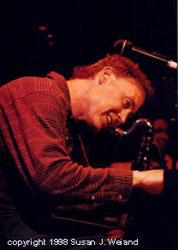 What
was that like for you to get the recognition for something so different
than the industry standard?
What
was that like for you to get the recognition for something so different
than the industry standard?
Well they were great flukes. (laughs) They were wonderful accidents. Nobody thought that "The Way It Is" was a hit – it just broke in England on BBC radio.
And that song has been re-sampled an couple of times, right?
Oh lots of people have [re-sampled it] but most notably, the one that you or most people know is the Tupac Shakur song "Changes" – and it became a hit again around the world. Actually, "The Way It Is" has been re-sampled in six different Rap songs - most recently by the rapper Mase.
That’s so cool! A lot of the Dead fans attributed much of the excitement to the music to you. Maybe it was a little stagnant before you joined up, that’s a weird way of putting it…
But it’s probably pretty accurate.
How do you think your presence affected them? It seemed like you got them hyped up…
Oh, I don’t know. I guess after you’ve been doing something for 20 plus years, you have to work to stay interested. As far as Garcia goes, he and I had a strong musical connection from the start and we played off each other quite a bit once I joined the band sort of part-time… I think you probably saw it. You know we played off of each other all the time.
Oh yeah! You’d kind of egg him on too…
Yeah, I would definitely try to push him. That was sort of my self-imposed job description. I wanted to jack him up because I thought that sometimes he would just stick his head down and just kind of lose or ignore everybody. Sometimes he would just get deep into his own thing and not really be a part of the band.
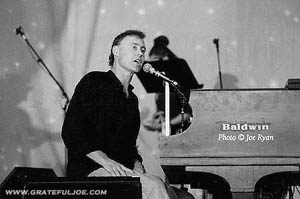 So
you sort of brought back the interaction.
So
you sort of brought back the interaction.
I just wanted to jack him up a bit. It was just one of my aims. (laughs)
You played with Jerry Garcia Band in ’91 just one time in Hampton. How was that different than playing with the Dead?
One thing that was different about it was that I wasn’t playing the piano, I was playing this bootleg keyboard which wasn’t as much fun for me, but I loved playing with the Garcia Band because it was just a different musical setting. It wasn’t quite as exploratory – it was more about the songs themselves.
More structured…
Yeah, more structured, but let’s not kid ourselves into thinking that the Grateful Dead was this incredibly loose structured thing – it wasn’t. It’s been given a lot of credit – or sometimes blame – for being this improvisatory, totally spontaneous thing, and it really wasn’t – certainly by the time that I got into the group. It was very structured – too structured for me frankly. It was way more structured than my band. I know that may surprise people, but it’s absolutely true. If you listen to the songs and divorce yourself from this notion that they were always changing things you’ll see that things weren’t that different.
A lot of songs were played in the same positions in the sets and so forth.
Not just that, but also that the songs were played virtually the same way every night – because that’s a fact – but even down to where they would play the songs. It was so structured. They were already entrenched in tradition by the time that I got there. I would say things like, "Let’s start with the drums!" and they would say, "Oh no – we can’t do that!" I would say, "Let’s open with "Wharf Rat" tonight" and they would say, "Oh no man, that always comes after the drums." (laughter) I’d say, "Let’s play China>Rider to open the show" and they’d say, "Oh no that always comes in the first part of the second set." (laughter) It was just unbelievable. So this myth about the spontaneity of it was just that, a myth. That was a little disappointing to me because I was never into that. I wanted it to be continually fresh.
What about when you played with the Other Ones – how much improvisation was going on there?
Well, although everyone had a great interest in stretching it, and actually being truly spontaneous and in the moment, it doesn’t happen like that that often. It’s still more like the later Grateful Dead days…
You seemed to throw a few curveballs at the guys though, here and there – like at Darien Lake, Let It Grow into Tennessee Jed – Bobby looked a bit surprised!
Right – that’s exactly the kind of thing I’m talking about. They like it, they’re into the improvisation, but it’s sort of throwin’ them for a loop because they’re not used to it. I’ll do that kind of thing at anytime at my gigs.
But it definitely seemed like there were some improvisational moments with the Other Ones…
Certainly between Kimock and myself, and between Alphonso and myself, but we didn’t do it a lot. The format is not that open to it because the Dead’s music is not really open to being totally spontaneous in that way. I know this might not be what you want to hear (laughs). I guarantee you it was in the first ten years of the band – they really were everything they were purported to be – but later things changed. If you think about it, you’ll know I’m right. I mean how different really were the versions of songs night to night? They really were not that different. You’d never hear them go from China Cat into Me and My Uncle, which they could have because it’s the same feel as I Know You Rider, then back into China Cat or whatever. It just wouldn’t happen.
So that kind of thing must be one of your main goals with your band?
Sure! With my band, that’s something we always aim for, and that’s one of the things I’m most proud of with my new live record. It showcases the spontaneity of my band in a live situation where you never know what might happen next – most of the time, we don’t know what’s coming (laughs) and that’s part of the beauty of it. That’s what you’ll experience with this new live record of mine – always new, instant compositional moments that happen in the moment and differ from night to night. With my band, my guys are ready to turn on a dime and go wherever. That’s what makes the performances very exciting.
What was your criteria for selecting live tracks for the new album, Here Come the Noise Makers?
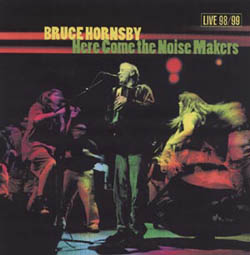 Well,
there’s some late ’98 songs, 1999, and NYE 2000 – some from shows we recorded,
some from TV shows we’ve played on – BET Jazz Central and the Woodstock
Festival we played. We just went through a bunch of shows and picked what
we thought were the best, and the songs which also showed the stylistic
range in our music – from the songs utilizing the Jazz language harmonically
to the Bluegrass moments. It’s probably the only record you’ll listen
this year where you’ll hear Samuel Barber, Bud Powell, Bill Evans, Bob
Dylan and Bill Monroe and old fiddle tunes on the same record… and George
Gershwin also.
Well,
there’s some late ’98 songs, 1999, and NYE 2000 – some from shows we recorded,
some from TV shows we’ve played on – BET Jazz Central and the Woodstock
Festival we played. We just went through a bunch of shows and picked what
we thought were the best, and the songs which also showed the stylistic
range in our music – from the songs utilizing the Jazz language harmonically
to the Bluegrass moments. It’s probably the only record you’ll listen
this year where you’ll hear Samuel Barber, Bud Powell, Bill Evans, Bob
Dylan and Bill Monroe and old fiddle tunes on the same record… and George
Gershwin also.
I read somewhere that one of your attractions of Bluegrass was that it required a certain virtuosity on the instrument – and the piano and accordion are not traditional Bluegrass instruments…
Well, we played the Telluride Bluegrass festival this year, we’ve played it three times now and I just love the festival. There’s a Bluegrass version of a tune I wrote that was a hit for Huey Lewis called "Jacob’s Ladder" and we do it Bluegrass on this record. I have lots of Bluegrass moments – most people wouldn’t know about them because Bluegrass music was generally performed under the mainstream radar screen (laughs). For instance the new Ricky Scaggs Bill Monroe Tribute album – I’m the first song on that.
Oh yeah – that’s outstanding…
Oh you’ve heard that! Great, Great – so you know it!
Yes, and I also have a tape from the ’89 Telluride Bluegrass festival with you, Mark O’Conner, Jerry Douglas and Bela Fleck. Was that one of your first interactions with a Bluegrass band?
Right man! Well that came about because I had played on the Nitty Gritty Dirtband’s May the Circle Be Unbroken record – "Valley Road Bluegrass" and we won the Bluegrass Grammy and I’m very proud of that record. From that, I got asked to do the Telluride Bluegrass Festival. We ended up playing with the New Grass Revival and we had a great time. I feel very at home in that context and Ricky [Scaggs] and I are going to make a whole Bluegrass record together. I’m really excited about that. Hopefully we do it some time next year.
Fantastic. I can’t wait for that!
(laughs) Me too!
Will you be out on the road to support the new album?
Yeah, we’re doing three weeks – November 2nd, starting in Seattle, ending around the 20th or 21st in the East – maybe Charlotte or Durham. I’m playing a solo piano concert with Elton John at the Paramount Theatre at Madison Square Garden (NYC). But with my band, we’ll be doing stuff from the record and we’ll also be rehearsing some old songs to bring back – like my sort of quasi-riff of Estimated Prophet called Tango King. Which is in 9/8 time – a very fun song that we haven’t played in years, so we’ll bring that around and Country Doctor which is a song which Pat Metheny played a glorious solo on the record. We’ll put a few others back into our repertoire – we’ll probably have about seventy songs.
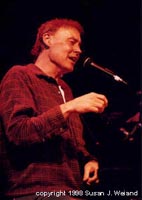 Do
you have any preference between playing solo, with a band, big, small…
Do
you have any preference between playing solo, with a band, big, small…
No, I do it all, but I do love to play solo. We get to do a lot of different things – we played the Telluride Bluegrass Festival, then the next week in June, we played the JVC Jazz Festival in New York City, then we’ll play with the Symphony Orchestra here coming up – and Kimock will join us, and I’ll do a solo concert, then our regular band shows, and then there’s the Other Ones too.
So your band can do just about anything!
Oh yeah! (laughter)
Maybe you can clear up a question for many Steve Kimock fans: Back at the Yoshi’s shows in 1998 when Phil and Kimock joined you, you said you wrote Rainbow’s Cadillac for Steve – is that true?
Nah, I was just completely jivin’ (laughs). I was probably just blowing smoke while he was setting up. I didn’t even know who Steve Kimock was when I wrote Rainbow’s Cadillac. When I wrote it, I was inspired by an old Bill Monroe tune called Uncle Pen. It’s a song about this great charismatic guy and I just thought I’d do my version of it, which was about a playground basketball legend.
You played at the Philharmonia back in ’97
That was a fun day. I especially enjoyed meeting and hanging with Michael Tilson-Thomas. I felt a really strong connection with that guy. He’s the best. That was a really fun time. I also enjoyed hooking up with Edie Brickell again. I hadn’t seen Edie for years – I was on one of her records years ago in her New Bohemians days – I always liked her.
She’s such an incredible musician. With Rob Wassserman’s album, Trio’s – you were on that album and so was Edie and Jerry for some completely improvisational songs…
I wrote "White-Wheeled Limousine" for that record. Yeah that’s a good record. I wasn’t around for the Jerry/Edie improvisationals though.
When John Molo left your band, was it a tough thing to replace him?
Well, that was my idea. I thought it was time to hear a different sound in my band and we had been having some personal problems. He could tell that I was dissatisfied and it bothered him and I understood him – I could see where he was bothered by it. We started playing with The Other Ones two years ago and we were out having sushi one night and I said, "You know Molo, we’re having a lot more fun with this [Other Ones] thing than we are with my thing. Why don’t we take a break?" And he said, "Yeah, I think it’s a good idea."
Well yes, but it was really coming from me. It was my idea because I was interested in doing something different. We had been playing for 21 years together and I just had an interest in hearing a different sound with my band – so it was really coming from me. He did not quit, it was my idea. And to be honest, I’m not sure he really wanted that to happen – so you really can’t call it a "mutual decision." I think he wanted to play in my band – but I do think he felt that it was a good idea that we take a break. There was a little dissension in my band. Molo and I are like brothers – old, close friends. I don’t think that later he was too psyched about it, but frankly I think that that was the best thing that could’ve happened to him. Since he hooked up with Mickey Hart and Planet Drum and most notably, since he hooked up with Phil, to me, Molo has just flourished – especially in Phil’s band. He’s just flowered in that scene. He was just fabulous in The Other Ones first tour – to me he was the Most Valuable Player. He was the guy to me that made that project special. True, it was great that Phil, Bobby and Mickey were there together – that was the greatest thing and I think that’s what most Deadheads have focused on – but for my money, Molo was the man. He really drove that train in such an incredible way and he continues to do that in Phil and Friends. So to me, at first I don’t think he was really that into not playing with me – in fact I know he wasn’t. I think he did want to take a break but he wanted to still play with us eventually. But frankly, I think he's way better off without me! What he’s doing with Phil and Friends is SO great! You know he’s got his own record deal now – you’ve heard about that with Verve?
The Modereko project…
He’s really got a lot going on now and Modereko sounds like a great thing – that’s also with two other guys from my old band – one guy who still plays with me – Bobby Read and John D’Earth.
Do you have plans for New Year’s Eve?
I think there’s supposed to be an Other Ones show – there’d better be (laughs) because I turned down a great gig for my band and told them that I would do it – there better be! (laughter)
Okay here’s an easy one for you – who do you like in the baseball playoffs?
Oh the Cardinals – definitely! If they go to the series my boys get to be batboys so we’re waaaay into the Cardinals! (laughs) Just one last thing about the Phil and Friends stuff – I can’t wait to hear them. I’ve heard only fabulous things about them and frankly especially Molo. He seems to be totally "the Man!"
He most certainly is! Phil has been calling him "Mount Saint Molo!" (laughter)
Yeah, (laughs) Molo told me that. I’m happy for Molo because like I said I wasn’t so sure he was so happy playing with me – but now – whew – he’s well rid of me! (laughter)
And you sound like you’re happy with the way your sound is now with your band.
Yes I’m feeling good about where my music is headed also. I think it’s good for everybody. I hope he feels that too and I think he does. I hope that when you hear the live record you’ll think so too. (laughs)
I’m sure! Well I thank you for your time. Take care now and I’ll see you on tour!
You’re certainly welcome. Thank you!
For more information on Bruce Hornsby, his band, tour dates and merchandise, please visit BruceHornsby.com.
Here Come the Noise Makers as well as Bruce's other albums can be found in stores everywhere or on the web at CDnow.com.
Also see other interviews with Bruce on Music Box and OtherOnes.net
Special
thanks to Bruce Hornsby
and Dave Rose of Deep South Entertainment.
Thanks
to Joe
Ryan Photography, Susan
J. Weiand Photography and
Robert
Minkin Design for use of their photos.
Thanks again to Tim Morris for help with interview preparation.
Conducted
10.9.00
by Bret Heisler
Interview
written & produced by 2012
Productions.
Thanks
to Tim Morris for help with interview preparation.
©2000
www.philzone.com
and www.2012productions.com.
All rights reserved.
All photos ©1997-2000 by photographers noted.
This interview may not be reprinted anywhere in any form - online or offline
-
without the express written consent of the photographer and Philzone.com.
However, we certainly encourage you to link here.
